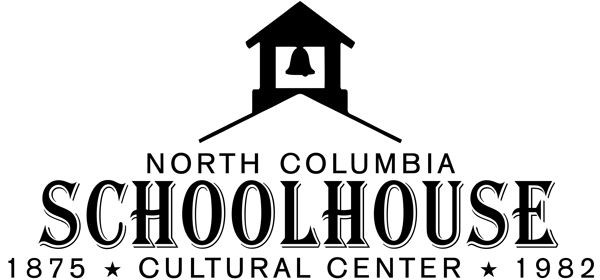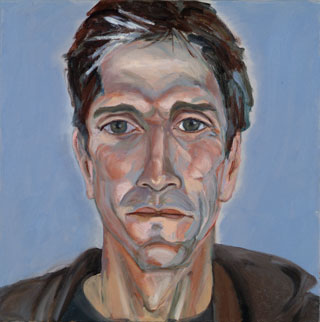“It’s really the liking doing it and liking the produce. We were just packing our CSA (community supported agriculture) boxes this morning – and just getting to handle this beautiful lettuce, it’s amazing. It’s just really beautiful. It’s an aesthetic experience.”
–John Tecklin
An Excerpt from the Interview
NCSCC: What’s your first memory about being here?
John Tecklin: Well, when we first moved here we were living in the trailer park down on Pleasant Valley Road near where one of my current farms is. I have lots of great memories of playing around there and the logger who lived in the other trailer and getting to ride in his muscle car. His son now still lives on Pleasant Valley Road and I still know him. Playing in the woods around there, yeah, it was a beautiful spot. I also have early memories of camping out. I think even before that, my parents camped out for a summer, the first summer we lived here. So living outdoors, fire pits, stuff like that.
NCSCC: And do you have brothers and sisters?
John Tecklin: I have a little brother, yeah. Two years younger than me.
NCSCC: Oh, so he was almost a baby when you guys moved here. And how many different places did you live when you were a kid? How did you move to other areas or places?
John Tecklin: Well, it was pretty rustic when I was little. There was that camping period, then my parents got a school bus so we lived in a school bus for several years. They had bought a piece of raw land and they were doing the homesteading thing and back to the land people, you know? And so we lived in this school bus for a few years while they built a house. And they built a log cabin with logs cut from the land. The chainsaw was the only power tool, so it was all hand tools, you know, the hand-crank drills that they got in the thrift store, hand saws and people were learning how to sharpen the old hand saws and chisels. No generator. There was running water, but when we moved into the house that was a big deal, living in a log cabin. Big step up from the school bus. But we still didn’t have any hot running water until I went to high school, so that would’ve been 1980 or something like that. We didn’t have telephone for a very long time either, so everybody had CB radios. We didn’t even have a CB radio. We had to go to our neighbor’s to use their CB radio.
NCSCC: What was that like for you as a kid growing up?
John Tecklin: Well you know, everybody asks that but the thing was I didn’t know any different. So to me it was just the way it was. Now looking back on it, it’s kind of amazing and very… and then when I went to high school and in college and beyond, I realized how different my experience was from the vast majority of everybody I meet. And there’s a lot to that, to having a very different life than everybody. There’s a lot of issues there.
NCSCC: Did you go to Grizzly Hill?
John Tecklin: I went to all the different schools around here, because the schools were in transition then and it wasn’t really setup or settled. And I think they had some kind of regulatory concerns. They weren’t even supposed to be using these buildings because they were all so old and funky at that time. Now the (North Columbia) schoolhouse is really nice, but it was totally ramshackle back then. There were no toilets. There were outhouses back behind that were really horrible. I even knew that. And it was really falling apart. I mean, there were places you could fall through the floor and there was lots of kids in one room. And I remember the old bell, and there was an old bell rope and you could swing on that.
NCSCC: I’m guessing that other kids that had come into this school had similar kinds of homesteading experiences because that was a big deal back then.
John Tecklin: I think so, but there were only a few other kids. That’s the other thing. I didn’t have many that were my age. There was a whole wave that came right behind me, but there weren’t very many others. And I think my family was particularly rustic also, because I came to realize afterwards that other people did have hot, running water. These things were available; it’s just kind of my parents chose, and I think they were particularly poor too. So that was another thing. They didn’t have the means.
NCSCC: Did they talk to you about whether it was a choice to build a home or choose to buy land and homestead? Did you have a family conversation about why they made those choices?
John Tecklin: Not when I was little, no, it was just what we were doing. Later on – much later on – I asked them, once I started to realize how different it was, maybe when I was in high school or college. But early on this was where we lived. This is what we were doing.
NCSCC: So you went to school at the (North Columbia) schoolhouse, that’s great. You’re probably one of the younger ones that have had that experience around here.
John Tecklin: Maybe so. It might be one of the last years it was used. I think maybe I was in second grade or something like that. I went to kindergarten at the North San Juan school, then I don’t know the dynamics of why they kept opening and closing these old one-room schoolhouses. But soon after that, the Oak Tree school was built. And I went there by maybe third or fourth grade, I went to that school, then that school quickly burned down. Then we dispersed again to the old schools. For a period of time I went to the Cherokee School which is now a totally defunct old building but it’s still there, back to the North San Juan school in sixth grade, and then they rebuilt the Oak Tree school and I was back there for seventh and eighth grade. For a period of time I went to school at the CDF station too. That was right after the (Oak Tree) school burnt down. Yeah, I remember the day that school burnt down.
NCSCC: What happened? Tell me about your memory.
John Tecklin: I just remember waiting for the school bus, and a truck drove up and it was smoking. The truck was smoking, and they said the school burned down.
[Editor’s note: Listen to the audio excerpt from the Robert Erickson interview to hear the story of Oak Tree School.]

